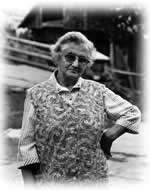 |
 |
||
 |
|||
|
RELATED THEMES history migration resettlement social relationships OTHER LOCAL THEMES BACKGROUND |
identity
Issues of identity run through many of the Klodzko Valley interviews, which is not surprising given the complex history of settlement and forced migration to and from the area. The largest group of in-migrants are the Poles who were moved from the eastern territories after the Second World War. Some of these resettlers, who had to uproot themselves from their homeland hundreds of miles to the east, after a traumatic war which in many cases also brought incarceration in Siberian camps, found it hard to settle in such a different landscape. Many retained their old traditions as a way of maintaining their identity, and some clung to the idea that this was a temporary location. Several of the more recent migrants, those identified as the intelligentsia déclassé, speak interestingly on this subject, having some of the detachment of "outsiders". They talk of their own difficulties in getting used to a completely different way of life. Several say that their urban, usually highly educated background makes them fundamentally different to the locals, and that although they have tried hard, over many years, to be accepted as working farmers, they continue to be perceived by some as "tourists". More than one comments that the earlier settlers' own disrupted past may have fostered a wariness of outsiders. Perhaps the most complex issue of identity, however, was experienced by those who were the original German inhabitants. In all cases, their relatives and neighbours were expelled from the area, and in a short period of time, those who remained became "outsiders" in their own community, isolated still further by their lack of Polish language. Narrators' stories vary - some were desperate to hide their German origins; others, perhaps finding themselves in less difficult circumstances, integrated well. Many of these narrators were women who stayed because they married Poles: in all cases their German traditions gave way to their husband's Polish customs. Some now identify themselves as Poles, while others, when reminded of their German culture, clearly still feel a keen sense of loss and sadness. Mostly, however, they do identify strongly with the Valley, and however complex their sense of nationality, the location - the mountains and forests - brings them comfort and a sense of continuity. One original (German) inhabitant says, "When I went to visit my sister in Germany I was looking for mountains everywhere, I missed them.... And when I'm on my way back... I feel I'm returning home" (Poland 19). And another: "I was born here, I grew old here and this is my place, I think. My nationality is German but this is my motherland, my place on earth" (Poland 41). quotes about identity
""Well, I've got some Czech blood, some German, all mixed with Polish - who could I be? Only a European."" ""From the very beginning, I was trying to hide the fact that I was German. I had to behave like a Pole, otherwise it would have been too dangerous for me. Especially when my children were born, I had to be careful about how I behaved. I wanted very much that my children should speak German, but it was impossible to teach them. At that time that language was forbidden."" ""The people living here identify themselves with these areas more and more . I mean, you need whole generations before we get integrated with the environment, before we say we belong here. The link is manifested by the households getting prettier and prettier, flowers appearing in the gardens . It seems to me that the generation of our parents had the feeling of temporariness - whether they realised that or not. It was only after the agreements had been signed between Cyrankiewicz and the German Chancellor Brandt, that real estate registers were introduced."" ""I've made quite frequent trips to the Czechs, and I must say, I got fascinated with their feeling of stability, continuity, local culture, provincial culture which we don't have. Those little towns of Usti on Orlica, or Litomysl, they have a cultural standard comparable with my beloved Cracow. But that results from the fact that people have been living there for generations. I think, we are gradually going in the same direction. That makes me happy."" ""At the beginning, [the locals] were rather suspicious.... Step by step, the distance was shrinking. [Anyway] I felt it was better for us if I got into that society gradually. However, I didn't mean becoming an equal member of it. Our intention is to stay strangers, in a way. We realise that our values and intellectual status are and will always be different from original country people."" |
|
